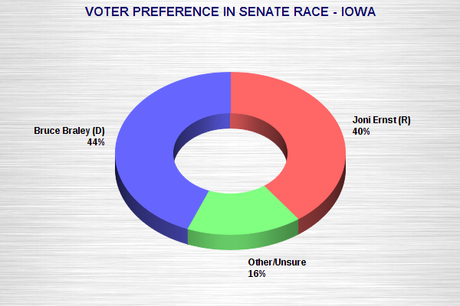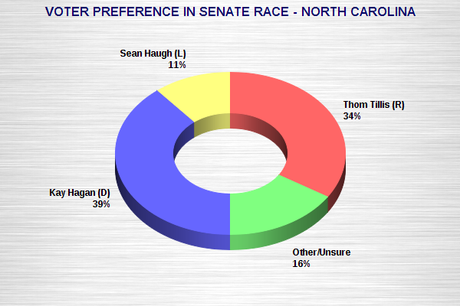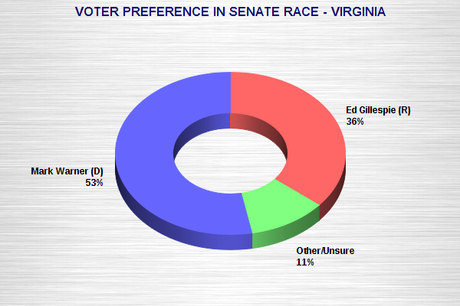


Iowa, North Carolina, and Virginia are among the states that the Republicans thought they had a good chance to pick up a senate seat from the Democrats (along with Arkansas, Alaska, and Michigan). Recent polls have shown that Democrats are leading in Arkansas, Alaska, and Michigan -- and now new surveys show that Iowa and North Carolina may be starting to slip away, and Virginia could already be a lost cause.
A month ago, Joni Ernst (the GOP candidate) was looking pretty good in Iowa. But a recent poll shows that Bruce Braley (the Democratic candidate) has now assumed a 4 point lead. That's still close, but it is beyond the margin of error. The really interesting thing about this race is that men prefer the female candidate (44% to 40%) while women prefer the male candidate (47% to 36%). It looks like party and ideology trump gender in this race.
Braley also leads among three of the four age groups:
18 to 29...............41% (D) to 29% (R)
30 to 49...............39% (D) to 44% (R)
50 to 64...............45% (D) to 42% (R)
65 & over...............48% (D) to 38% (R)
It's a good sign that Braley has an 11 point lead among women and a 10 point lead among seniors -- because women usually vote in slightly larger numbers than men, and a larger percentage of seniors vote than in any other age group. That means Braley could win even with a moderately low turnout.
A few weeks ago North Carolina was looking like a dead heat also, but now that it is known that Tillis is the GOP nominee, incumbent Kay Hagan (the Democrat) has staked out a four point lead -- aided by the presence of a Libertarian in the race getting 11% of the vote. I'm not as comfortable with these results, because Hagan has only a 2 point lead among seniors (although she has a slight lead among all age groups) and the women's vote is currently split among the candidates. She's going to need to win over a significant portion of the 20% of women who say they are still undecided.
The Virginia race seems to be well in hand for the incumbent Democrat Mark Warner. He has a favorable rating among the voters while his opponent does not -- and he currently holds a 17 point lead over Republican Ed Gillespie. It's going to be very tough for Gillespie to make up that difference, especially since Virginia has trended Democratic statewide in recent years.
The Iowa chart is from a Quinnipiac University Poll done between June 12th and 16th of 1,277 registered voters, and has a margin of error of 2.7 points.
The North Carolina chart is from a Public Policy Polling survey done between June 12th and 15th of 1,076 registered voters with a 3 point margin of error.
The Virginia chart is from a Rasmussen Poll done on June 11th and 12th of 750 likely voters, and has a margin of error of about 4 points.

